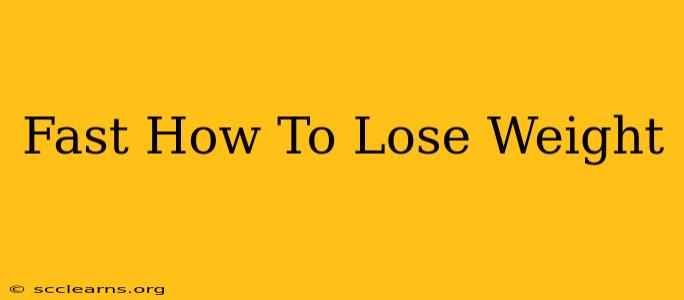Losing weight quickly can seem appealing, but it's crucial to prioritize healthy and sustainable methods. Crash dieting often leads to muscle loss, nutrient deficiencies, and ultimately, weight regain. This guide outlines fast, yet safe, strategies for weight loss that focus on building healthy habits for long-term success.
Understanding the Basics of Fast Weight Loss
Before diving into specific techniques, let's establish a fundamental understanding. Rapid weight loss generally refers to losing 1-2 pounds per week. While more significant weekly losses are possible, they're often unsustainable and potentially harmful. Remember, sustainable weight loss is key. Focusing on lifestyle changes, rather than quick fixes, ensures long-term results.
Key Factors in Accelerated Weight Loss:
- Calorie Deficit: To lose weight, you must burn more calories than you consume. This doesn't mean starving yourself; it means making conscious choices about your diet and increasing your physical activity.
- Nutrient-Rich Foods: Focus on whole, unprocessed foods like fruits, vegetables, lean proteins, and whole grains. These foods are filling and provide essential nutrients, preventing nutrient deficiencies often associated with restrictive diets.
- Regular Exercise: Combining a healthy diet with regular exercise accelerates weight loss and improves overall health. Aim for at least 150 minutes of moderate-intensity aerobic activity per week.
- Hydration: Drinking plenty of water helps you feel full, aids digestion, and boosts metabolism.
- Adequate Sleep: Lack of sleep disrupts hormones that regulate appetite and metabolism, making weight loss more challenging. Aim for 7-9 hours of quality sleep each night.
Fast Weight Loss Strategies: Practical Tips
Here are actionable strategies to help you achieve fast, healthy weight loss:
1. Prioritize Protein Intake:
Protein is crucial for weight loss. It keeps you feeling full for longer, boosts metabolism, and helps preserve muscle mass during weight loss. Incorporate lean protein sources like chicken breast, fish, beans, lentils, and Greek yogurt into your diet.
2. Increase Fiber Consumption:
Fiber-rich foods, such as fruits, vegetables, and whole grains, add bulk to your diet, promoting satiety and aiding digestion. This helps you consume fewer calories overall.
3. Cut Back on Refined Carbs and Sugars:
Refined carbs and added sugars contribute to weight gain and offer minimal nutritional value. Limit your intake of processed foods, sugary drinks, and white bread.
4. Incorporate Intermittent Fasting (IF):
Intermittent fasting involves cycling between periods of eating and voluntary fasting on a regular schedule. Various methods exist, and it's essential to choose an approach suitable for your lifestyle and health status. Consult your doctor before starting any IF regimen.
5. Engage in Regular Physical Activity:
Combine cardio exercises like running, swimming, or cycling with strength training to build muscle mass and boost metabolism. Even short bursts of activity throughout the day can make a difference.
6. Manage Stress Levels:
Chronic stress can lead to increased cortisol levels, promoting weight gain. Practice stress-management techniques like yoga, meditation, or spending time in nature.
Maintaining Your Weight Loss: Long-Term Strategies
Achieving fast weight loss is just the first step. Maintaining your results requires consistent effort and the adoption of long-term healthy habits.
- Focus on sustainable lifestyle changes: Don't view weight loss as a temporary fix. Make lasting changes to your diet and exercise routine.
- Monitor your progress: Track your weight, food intake, and exercise to stay accountable and make adjustments as needed.
- Seek support: Join a weight loss group or work with a registered dietitian or personal trainer for guidance and support.
- Celebrate your successes: Acknowledge and reward your progress to stay motivated.
Disclaimer: This information is for general knowledge and does not constitute medical advice. Consult a healthcare professional before making significant changes to your diet or exercise routine, especially if you have underlying health conditions. Rapid weight loss can sometimes indicate an underlying medical issue, so consulting a doctor is always recommended.

